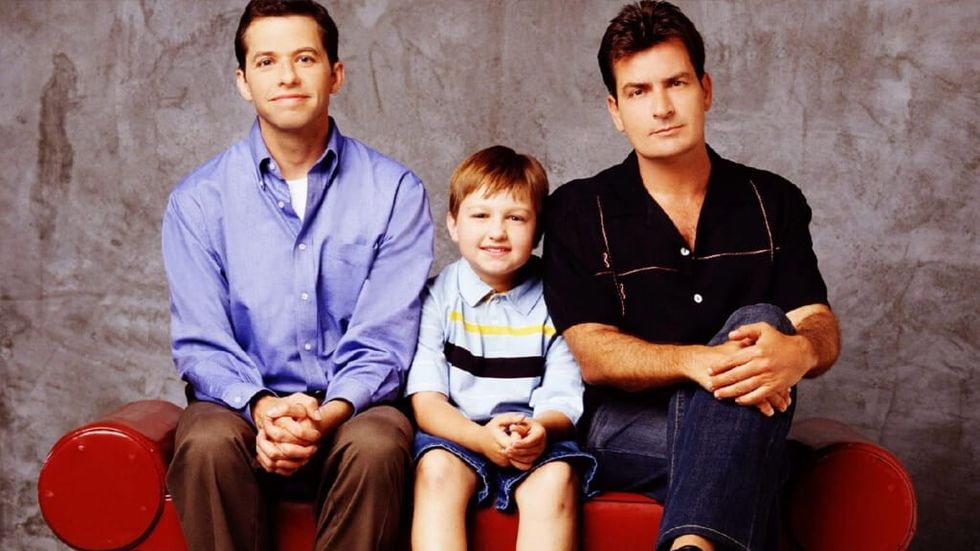Why Did Jake Leave Two And A Half Men? [Revealed]
Why did Jake leave Two and a Half Men? The sudden departure of Jake Harper, played by Angus T. Jones, from the wildly successful sitcom remains one of the most talked-about and, at times, perplexing moments in television history, sparking debate among fans and industry insiders alike.
The situation surrounding Angus T. Jones exit from Two and a Half Men is layered, involving a complex interplay of personal beliefs, professional obligations, and the inherent pressures of fame. While the show was a monumental success, catapulting Jones to stardom from a young age, it also presented unique challenges. His decision wasn't a simple one, but rather a culmination of several factors that ultimately led him to step away from the role of Jake Harper, a character who had become a household name.
Jones' public denouncement of the show and its perceived moral shortcomings played a significant role in his departure. In 2012, during a period of intense introspection and religious exploration, Jones gave an interview where he publicly criticized Two and a Half Men, calling it filth and urging viewers to stop watching. He expressed concerns about the shows perceived values and its potential negative impact on its audience. This marked a stark contrast to his previous public persona, where he seemed to embrace the role that made him a young millionaire. His shift in perspective was driven by a deep-seated commitment to his faith, leading him to re-evaluate his involvement in the show.
Jones' evolving religious beliefs were central to his decision. He became deeply involved in the Seventh-day Adventist Church, and his focus shifted towards spiritual growth and community involvement. The values he found within his faith were in direct conflict with what he perceived as the show's portrayal of life and morality. This internal conflict weighed heavily on him, leading him to believe that he could no longer reconcile his personal beliefs with his professional commitments.
The character of Jake, originally presented as a somewhat innocent and naive child, also evolved throughout the series. As Jones matured, the characters trajectory began to diverge from the actors own life. The humor and storylines, as they evolved, may have become less aligned with his developing personal values, further fueling his desire to distance himself from the role. While other actors have sometimes expressed dissatisfaction with a role, Jones criticisms were particularly pointed, indicating a profound disconnect between himself and the character he played.
The pressures of fame and the demanding schedule of a long-running television series also likely contributed to Jones decision. While the financial rewards were substantial, the constant filming, publicity, and public scrutiny can be overwhelming, especially for a young actor. The demands of the entertainment industry can take a toll, creating an environment where individuals may re-evaluate their priorities and search for a more balanced life. This may have also influenced his growing desire for a change of pace, and an opportunity to seek a more normal life that was outside the spotlight.
The situation also underscored the limitations of contracts and the complexities of balancing personal beliefs with professional obligations. Jones was contractually bound to Two and a Half Men, but his strong convictions drove him to a point where remaining on the show was no longer a comfortable or, in his view, morally justifiable choice. His departure required navigating the complex legal and professional aspects of breaking a contract, which involved a difficult period of negotiation and compromise.
In the wake of Jones departure, the show continued, though with significant adjustments to the storyline. Ashton Kutcher was brought in to replace Charlie Sheen in the role of the primary lead and to fill the void left by Jones's character to maintain the shows appeal. The change in the show's tone, and the absence of the character of Jake Harper, altered the dynamic of Two and a Half Men, reflecting the departures impact on the program's narrative and its ongoing success.
While Jones decision was a shock to many, his reasons provide insight into the life and career of a young actor navigating fame, faith, and personal growth. His choices highlight the complexities of maintaining personal values while participating in the entertainment industry and the challenges that come with reconciling both. The repercussions of his departure are still felt, shaping the shows legacy and the career paths of everyone involved. His story serves as a potent reminder that behind every character lies a real person with personal convictions and life choices. The reasons for his exit from Two and a Half Men were rooted in his personal growth, and these factors contributed to a major shift in the show's narrative and reception.
| Category | Details |
|---|---|
| Full Name | Angus Turner Jones |
| Born | October 8, 1993 (age 30) |
| Birthplace | Austin, Texas, U.S. |
| Occupation | Former Actor |
| Years Active | 20002016 |
| Notable Role | Jake Harper in Two and a Half Men |
| Religious Affiliation | Seventh-day Adventist |
| Personal Life | Married to Adrianne Jones (2019) |
| Education | University of Colorado Boulder |
| Reasons for Leaving Two and a Half Men | Religious beliefs, personal growth, criticism of the show's content. |
| Later Life | Attended the University of Colorado, distanced himself from acting. |
Reference: IMDB - Angus T. Jones
The impact of Jones' departure extended beyond just the character he played. The move sparked a public conversation about the influence of media on values and the challenges of reconciling personal beliefs with professional success. His story became a topic of discussion for many, from fans to religious groups, generating an ongoing dialogue about the balance between career and personal beliefs.
One of the key aspects of this was the timing of the decision. Jones' public criticism of the show came at the height of its popularity. This generated significant media attention, and highlighted the power of public figures to influence the entertainment industry. It forced the show's producers, writers, and actors to respond and adapt, making everyone question the show's future. The show, which was known for its often suggestive and satirical humor, had to change to fit the image of a changing audience.
It also created discussions of the shows legacy. The show's humor and its critical reception are an ongoing area of study for media studies. It can be seen that the show's success was driven by the on-screen dynamic, but also off-screen drama. These factors contributed to the discussion about artistic and cultural impact.
Furthermore, the shows writers had to find a way to manage the situation. The character of Jake Harper had to adapt to the changing landscape of the show. The audience, and the writers, had to adapt the character and story arcs of other actors involved in the show. This adjustment underscored the shows ability to navigate unexpected obstacles and its potential to embrace reinvention.
Jones departure from Two and a Half Men marked a critical juncture for both the actor and the show itself. The decision was not made overnight, and it was influenced by a variety of factors. It served as a point of reflection for its audience, industry professionals, and media critics. The changes prompted by his departure influenced the shows narrative. The audience was asked to reconsider the show's values.
Looking back, the repercussions of Jones' departure are still felt. It shaped the shows trajectory, and it continues to influence how the entertainment industry is perceived by the public. It has become a case study of how fame, faith, and personal growth can intersect and create a lasting impact. The reasons behind Jones' departure provide valuable insight into the life of a young actor and remind us of the importance of making personal choices. The events surrounding the departure continue to be remembered as the end of an era for the show.



